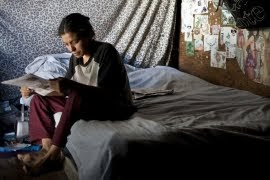 By Mike O'Connor — Special to GlobalPost
By Mike O'Connor — Special to GlobalPost Instead of reporting on crooked public officials or the growth of organized crime, newspaper editor Martha Lopez runs press releases from the Zeta cartel.
It's the latest move by the cartel in Mexico's escalating drug war, and one that she says she has no way to fight.
She said the gang has established its own public relations arm that issues stories the local papers are under orders to run, or else journalists will get hurt.
It’s the first time such a formal arrangement is known to be at work in Mexico. Journalists at the other three main papers in Ciudad Victoria — the capital of Tamaulipas state, across from Texas in the northeast corner of Mexico — confirmed her account.
In many parts of Mexico, organized crime and drug cartels have been able to terrorize journalists in local or regional news organizations into not running stories the criminals don’t want the public to know about. Reporters who try are threatened or murdered.
So, in much of the country, newspapers, TV and radio stations have just stopped covering stories that even hint about how organized crime is taking over.
“We’ve seen the killings in other states, and we know about the journalists who disappeared in Tamaulipas this year,” she said, referring to two reporters who were abducted in the city of Reynosa in March and are assumed dead. Here we have three cases of editors who were beaten two years ago.”
She is 40 years old. She has three children. She began working in journalism at 17, at local newspapers, a wire service and a national newspaper, in several states in Mexico. She is tough enough to have risen in the rough world of Mexican journalism, but she can’t see a way out of what’s happening now.
The press releases began arriving about four months ago, she said. They come by email, often including photos, to a police reporter who, it is assumed for bribes, is the Zeta liaison with the press, Lopez said. The reporter sends them on to other reporters who file them to their papers.
There are two editorial lines in the press releases. According to Lopez, the Zetas write their “stories” to make the Mexican army look bad. The army is deployed in the state to help fight the Zetas. So the Zetas send stories about army human rights abuses. “Some of those stories are accurate in a small way, but they are exaggerated. Sometimes they are not true,” Lopez said.
And, then, Lopez said, the Zetas want to make the local police look good. “They protect the police because the police are their allies,” she said. “We get stories about how the police or the chief are so wonderful, especially the chief.”
At first, Lopez said, there were three or four news releases a month. Now it's two or three a week, and the releases are reaching into the society pages. Recently, there was one about the birthday party of a 5-year-old boy, apparently the son of someone high in the gang.
When she gets one of the news releases she said she goes to her boss and the paper’s owner to say they should not run it. But, she said, they tell her "do what you have to do." That means run the story.
Cartel control is growing across Mexico, and the press is often one of the cartels' first targets. Their objective is to keep the public ignorant of their actions.
In Tamaulipas, for instance, cartels have penetrated the police and city governments to the point that the cartels almost have free reign, according to reporters in the state's five largest cities. But nothing of that is reported in the press, the reporters say. The most important story — that the citizens have lost control of their cities to criminals — is the one that cannot be covered.
The problem is that it's easy for hit men to target journalists with little threat of reprecussions. In less than four years in Mexico, 27 journalists have been killed or have disappeared, though because of faulty investigations it's impossible to be sure how many were targeted because of their work as journalists. But when a reporter or editor receives a phone call from a cartel thug saying not to run a particular story, they know it's a real threat.
Which leaves Martha Lopez with no way to confront the Zeta cartel’s new tactic.
The demands to run the propaganda will increase, she said, and the content will become more extreme. And the newspapers that run the stories will go from being silent on the matter of organized crime control to being agents of disinformation, helping organized crime strengthen its control over the region.
And if it works in Ciudad Victoria, the state capital, why not the rest of the state or the other places in the Mexico where cartels have so much power? What’s to stop them?









I just hope that the last name (Lopez) is not real, that drug dealers are everywhere, some also know English,and this reporter, could be killed by the information in this article.I hope that she and her family are safe.
ReplyDeleteI will pray that you are safe. Thank you for sharing the reality of your life and not the lies that most men are living in when in a position of power.
ReplyDeleteIs there a Government news agency in Mexico, if not why not,the people must be mobelized.
ReplyDelete@November 8, 2010 5:51 PM
ReplyDeleteYes there is. It's called notimex. Food for thought.
Believe me, your government news agency would be the FIRST to be seized and exploited by the cartels!
ReplyDelete